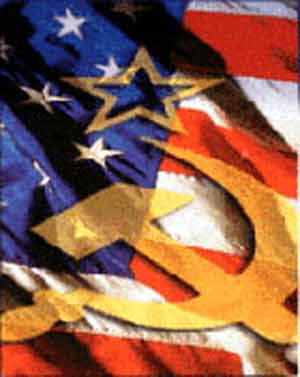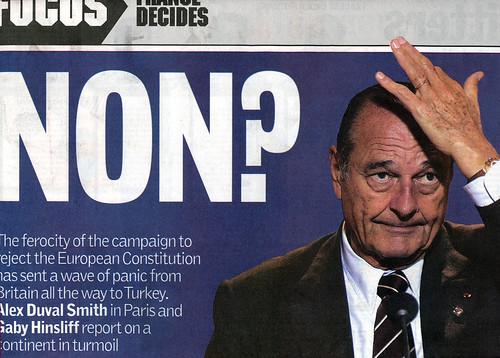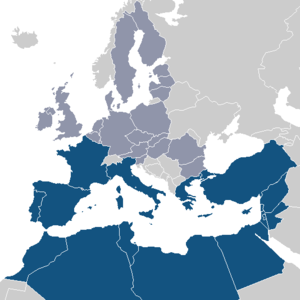By Robert Stein, PhD
June 13, 2008
Only sixty years ago, more than 70 million people died during and after World War II. Even in our wildest imagination, it is difficult for most of us alive today to conceive what life was like for those who suffered through the devastation of a near universal war. The experience of two successive massive bloodlettings in only twenty years, resulting in the death of two generations dramatically altered the mentality of Europe. The bloodiest continent for the previous five centuries, where the efficient science of human slaughter was perfected, has been peaceful since then. Pan-europeans, the offspring of the arrogant militarists who began those wars, are now largely socialist. They take pride in their pacifist traditions and limited military budgets. They scold the inexorably retro patriotism of Americans and their belief in the value of military hard power, while simultaneously ignoring the international stability which has accompanied the emergence of America as superpower.
However, what Europeans really fear, is not America, but themselves. When they criticize the muscular exercise of American power, which ended two world wars, they are really criticizing the racism and chauvinism of their own colonial past. America’s greatest bloodletting, the Civil War, purged the stain of slavery from the nation, rather than advancing national ambition. The First and Second World Wars so undermined European’s belief in themselves, that they are now fearful anytime America exercises its military superiority. Their overly developed sense of fear even extends to situations entailing the removal of malignant tyrants, such as Saddam Hussein, in order to prevent the emergence of a new fascism. Europeans are unable to understand why America, too, is not paralyzed with self-doubt. To protect the world, they advocate parceling out American power to the United Nations where most governments are not democratically chosen. Why an institution where most members are plagued by state sanctioned murder, abject racism, political repression, corruption and a lack of legal due process would act equitably is the height of illogic.
But cultural demons and national psychoses are rarely permanently exorcized. Europe’s insomnia during the 90’s Balkan conflicts brought into consciousness its latent fear that the dogs of war, long repressed, would exploit that opportunity to re-emerge. Despite ample economic capacity to support a high tech military, they so feared themselves that American intervention was required to again resolve another European conflict.
The problem resembles that of a reformed alcoholic. As a prohibitionist without exception bans alcohol, today’s socialist Europe and their new one-world sympathizers, don’t believe America can be a social drinker. Despite attempts to project their cultural impulses elsewhere, it is European fear of themselves and jealousy of America that currently poses the greatest danger to their own safety and economic wellbeing. As aged grandparents no longer able to drive themselves often shout out backseat commands, today’s socialists believe they can sloganeer America into retreating from the responsibility which has inevitably devolved on the world’s leading power.
The conflict in the Middle East and South Asia is a battle to advance the most important values of western civilization. Those who believe in the essential goodness of America, despite its inevitable flaws, will accept that the nation which was founded upon the best of European traditions, cannot sit silently while it is left to almost single-handedly protect those western values on the battlefield. It is time for Europe to emerge from its postwar phobia. There is no good reason why Europe cannot assume greater global military responsibility. Europe is not so infirm that it must sit and tremble inside its own continental home, debating whether the psychopathic criminal wishes it harm, and the American policeman wishes it well. If it chooses to recover from its trauma of sixty years, it might just realize that it doesn’t have to obey madmen with weapons and go quietly into the night.
-------------------------------------------------------------------------------------------------
In many ways, Dr. Stein's article addresses the ongoing problems of 'burden sharing' - i.e., Europe continues to benefit from the U.S. continuing to bear the lion's share of the obligation to maintain 'international peace and stability' through support of an expensive and extensive military infrastructure.As the following article reflects, Europe has exploited this relationship by diverting its resources to various initiatives (e.g., NEGATIVE SUSTAINABLE DEVELOPMENT LAW & POLICYMAKING) that run COUNTER U.S. NATIONAL INTERESTS.
THE SECOND BERLIN WALL
By Lieutenant Colonel Raymond Millen
Strategic Studies Institute
 The latest contretemps in NATO regarding burden sharing in Afghanistan has the distinguishing feature of being altogether pedestrian. European reluctance to contribute more troops and funding to Afghanistan has less to do with disagreements over strategy than it does with a pattern of behavior stemming back to the birth of the Alliance.
The latest contretemps in NATO regarding burden sharing in Afghanistan has the distinguishing feature of being altogether pedestrian. European reluctance to contribute more troops and funding to Afghanistan has less to do with disagreements over strategy than it does with a pattern of behavior stemming back to the birth of the Alliance.Few recall the contentious deliberations at the beginning of the Cold War between the United States and its European allies regarding military contributions to the Alliance. The Truman administration expected the European powers to reconstitute their armies once they had recovered economically. But, having little faith in the American security guarantee, European statesmen refused to raise sufficient forces for defense without a tangible commitment from the United States. With no movement on the matter, the United States relented, deploying several divisions to NATO in 1949. Yet, the European reciprocal pledge did not materialize.
 With security assured through collective defense and the U.S. nuclear umbrella, European states progressively invested in social welfare programs that demanded a greater portion of gross domestic products (GDP). And social welfare states are voraciously self-indulgent. During this transformation, an interesting pattern of behavior manifested. Rather than share collective defense equitably, member states attempted to shift security burdens subtly to other members. Other than voicing annoyance, the United States, as a global superpower in a bipolar world, accepted this behavior because the larger goal of peace in Europe remained intact.
With security assured through collective defense and the U.S. nuclear umbrella, European states progressively invested in social welfare programs that demanded a greater portion of gross domestic products (GDP). And social welfare states are voraciously self-indulgent. During this transformation, an interesting pattern of behavior manifested. Rather than share collective defense equitably, member states attempted to shift security burdens subtly to other members. Other than voicing annoyance, the United States, as a global superpower in a bipolar world, accepted this behavior because the larger goal of peace in Europe remained intact.Even had the United States objected to this sort of behavior, what could be done? Every state west of the Iron Curtain, whether a member of NATO or not, enjoyed the collective good of security. The United States certainly could not have denied this security to any particular state. Hence, allied compliance with U.S. security policy initiatives alternated between acceptance of America’s leadership role and American use of bargaining (e.g., financial and prestigious incentives). Ultimately, it was easier to ignore the behavior.
The end of the Cold War held different meanings for both sides of the Atlantic. For the Europeans, it meant a peace dividend with the inexorable drop in military expenditures, falling well below 2 percent of GDP. Perhaps this laxness would not have evolved had the United States withdrawn from NATO as most Realists predicted.
However, the United States, ever fearful of a security dilemma emerging again in Europe, sought to keep a united Germany subordinated to NATO, while also using the prospect of NATO membership to moderate the behavior of Central and East European states. With both policy vectors, the United States was eminently successful, but then, reacting to questions of NATO’s continued relevance, the Alliance added collective security missions to its repertoire. Whether the Europeans understood the implications of collective security or simply went along, never believing in its implementation, is anyone’s guess.
With the extension of the U.S. security commitment to Europe affirmed, along with the rise of the European Union (EU) in 1993, there arose among European statesmen a nontraditional view of foreign and security policy. The centerpiece of this new policy would rest on international institutions, regimes, and other normative devices to undergird security and stability. In theory, this approach obviated the need for high military readiness, which declined precipitously, and permitted even greater budgetary allocations toward social welfare programs, much to the satisfaction of everyone—except for the United States.
Much to the chagrin of western European statesmen, Hobbes’ state of nature threw cold water on the soft power approach in Bosnia, Croatia, and Kosovo, requiring American intervention (under the aegis of NATO) to resolve the conflicts. In response and with great fanfare, European governments pledged to improve military capabilities, first with the Defense Capabilities Initiative (DCI) and the Prague Capabilities Commitment (PCC), and, second, by the creation of the EU Rapid Reaction Force (EURRF) under the EU Headline Goal. Regrettably, European states did not increase military expenditures to meet the DCI/PCC goals, at least not with any type of urgency. Contrary to initial lofty pronouncements, the EURRF has not evolved into a European security pillar. Its offspring, the EU Battle Groups (EUBG), suffer from an inability to handle large crises and also from a lack of political will to deploy contingents into dangerous environments. Hence, the European security pillar is little more than a peacekeeping force with paltry combat capabilities.
The dichotomy between European rhetoric and action regarding Afghanistan is certainly perplexing. In the wake of 9/11, NATO did provide some assets to Operation Enduring Freedom under Article V; the coalition in Afghanistan includes many non-NATO nations; and all participating governments agree with the overarching goals for Afghanistan. Yet, the majority of European governments consistently fail to deliver on their financial and military pledges, many of which date back to 2003. A plausible explanation may be that European statesmen are prisoners of their political systems.
Fundamentally, European affinity for extravagant social welfare programs, the obsession with cutting military spending, and a distinct predilection for peacekeeping operations are manifestations of European political institutions. Because of their pluralistic design, parliamentary governments tend to be unduly influenced by the mercurial passions of the electorate. Moreover, coalition governments, that is, governments which lack a legislative majority and must form a government with other political parties, often experience paralysis over contentious issues and can even fall as a result.
The security challenges in Afghanistan have become divisive among coalition states precisely because they expose the old practice of burden shifting and because the United States uncharacteristically has not backed off its insistence for greater military contributions.
Transatlantic tensions will very likely become intractable. On the one hand, the old European standbys of claiming overtaxed militaries and implying other allies are not fulfilling their obligations have become threadbare with the United States. But on the other hand, populist attitudes that increased military spending to meet new challenges will threaten cherished social welfare programs appear to have boxed in European governments. The pawns of these national policies are the armed forces, which are deployed into theater as a coalition or Alliance balm and not as a force to render decisive results. Small troop contingents combined with a plethora of national caveats tend to undercut the theoretical advantages of multilateralism. In Afghanistan’s case, the sum appears to be smaller than the whole.
The real issue at stake is not whether success or failure in Afghanistan will endanger the Alliance; rather it is whether the United States will continue to see utility in NATO’s integrated military structure. NATO as an institution will remain because the United States sees utility in its continuance. However, in the future, the United States will likely revert to bilateral negotiations to build coalitions because of the niggard behavior of too many NATO members.
Similar to the first Berlin Wall, today’s metaphorical Berlin Wall symbolizes the enslavement of statesmen to the social welfare state and weak political systems. And while future generations will look back and ask why Europe slept when a challenge grew into a threat, this should be the starting point.
****
The views expressed in this op-ed are those of the author and do not necessarily reflect the official policy or position of the Department of the Army, the Department of Defense, or the U.S. Government. This colloquium brief is cleared for public release; distribution is unlimited.
*****
Organizations interested in reprinting this or other SSI opinion pieces should contact the Publications Department via e-mail at SSI_Publishing@conus.army.mil. All organizations granted this right must include the following statement: "Reprinted with permission of the Strategic Studies Institute Newsletter, U.S. Army War College."








